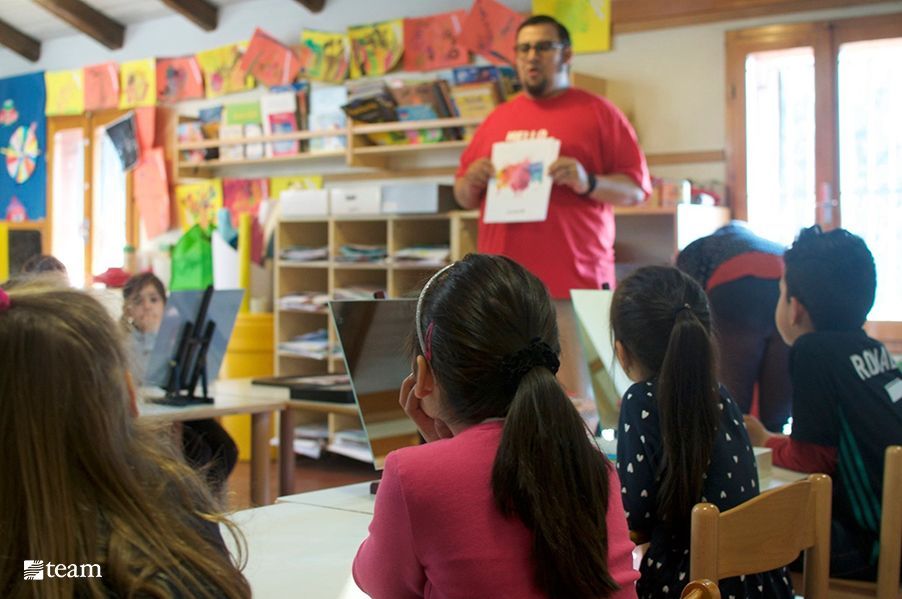Third Culture Kids, Part 1: Overcoming Challenges On-Field
What is it like to grow up among multiple cultures? Read now to learn more about the challenges third culture kids experience on the mission field.
My 6-year-old self and my 4-year-old sister, Bianca stepped out of our front door, along with our mom, and into a dark, gray hallway. It smelled like rusted staircase railings and old wooden elevators.
Sometimes the barely-big-enough-for-two-people elevator worked fine and sometimes it’d get jammed for a while. But we didn’t feel like walking down all the apartment stairs today, so we took our chances. The elevator creaked and rumbled, but made it to the bottom floor.
“Taxi?” I asked Mom as we stepped out of the old, graffitied building and onto the city sidewalk.
“The market is just around the corner,” Mom said. “Let’s walk. And please practice your Romanian while we’re out today.”
“Bine,” I said, now in Romanian. “After the market, can I get some plăcintă from Mrs. Botiș? I’m hungry.”
Home, but not Home

My family and I standing in front of the church my dad pastored. I’m the little girl on the left. Photo courtesy of Brianna Langley
Although not a typical childhood anecdote, for third culture kids, days like the one I just described are pretty common.
Bianca and I were raised as a missionary kids in Romania off-and-on during my second through tenth years of life. So at home, we were American in speech, meals, entertainment, etc. But as soon as we left our apartment, we would hear Romanian, ride trams and eat things like plăcintă and sarmale.
One of the many unique experiences that come with being raised overseas is realizing that when you talk about “home” and your parents talk about “home,” you’re referring to two different places.
You’re home — at least, the only home you know. But you also recognize that there’s this other, ambiguous home out there that your parents talk about all the time.
TEAM’s director of organizational development, Josh McQuaid, lived in Paraguay as a missionary kid from age 9 until he was 18, and he remembers changing his behavior based on certain social settings.
“I became very conscious of the fact that Americans were really loud and obnoxious,” he says. “And so, I would really consciously tone that down, and I still probably do in a lot of contexts.”
As a TCK, you have an insider’s perspective and an outsider’s perspective. That can make it hard to hear your parents complain about your host country.
For parents of TCKs, it’s important to remember that the strange land you’re navigating is familiar and comforting for your child. To them, it’s home.
Embracing Differentness
TCKs sometimes struggle with being branded as “different.” Your childhood friends are usually nationals — and you’re not.
“I mean, they lived in poverty and I didn’t. There were just really obvious things like that that made it really clear,” says Josh. “It felt to me, like, almost inappropriate not to recognize that I was from somewhere else. … So, it was better for me to be conscious of the fact that I was American, but I just didn’t want to act like ‘the typical American,’ if that makes sense.”
Even if you maintain friendships with peers in the States, you will still have different experiences — and probably different worldviews.
TEAM marketing specialist Emily Sheddan moved to Southeast Asia when she was 6. She really pushed back against her parents’ decision to become missionaries during her first few years on the field.

Emily learned her host language quickly, which was a huge help to her parents in meeting people. Despite her thriving language skills, Emily still struggled to accept her place on the mission field (center). Photo courtesy of Emily Sheddan
“I didn’t want to be associated with growing up overseas, just because it separated me from my friends in the States,” she says. “It was hard to relate to my friends because they just thought I was above them sometimes since I grew up in a different country.”
TEAM photography and digital media intern Nate Murphy moved to Venezuela when he was also 6, and learned early on to embrace the “differentness” of being a TCK. To him, learning to love his uniqueness has been invaluable.
“I like that I kind of grew up having that mindset. Because a lot of people do come to that eventually,” says Nate. “Usually around college, you’re like, ‘I don’t care what people think of me anymore.’ … And I think it’s just a good thing to know yourself well enough to actually be yourself.”
Quirks and Coping Mechanisms
TCKs also tend to develop certain quirks that become part of who they are as adults.
“One of the things that I do remember is that I would — and still do to this day — have a really hard time maintaining relationships with people that are not currently in my context,” says Josh. “Most of the time, it’s like, if they’re not in the circle of people that are in my city, I’m not gonna stay in touch. Like, I’m just gonna be here.”

As a TCK, Nate (pictured far right) learned to embrace his uniqueness from growing up in a different country. Photo courtesy of Nate Murphy
TCKs grow up drifting in between cultures during their most formative years. For a child, that can be confusing.
Without even realizing it, you pick up coping techniques — like blocking a language from your mind when you’re not in the correct context.
“I was 5, and I spoke three different languages besides English,” says Beth Fussner, TEAM’s learning and development program director. “I could literally switch between all three at will, depending on the person I was talking to.”
Beth was born on the mission field in the Philippines. She didn’t see the States until her parents’ home assignment year when she was five.
“And then I just refused to speak anything but American English when we were here. … I was like, ‘Nope. We don’t talk that language here, so I will just totally refuse,’” she says. “But a year is a long time for a 5-year-old and … I never fully picked it up again.”
As a parent, one of the best things you can do for your TCK is teach them to embrace every part of who they are. There’s good and bad in every culture — empower them to choose which parts of each culture they want to hold onto.
Benefits versus Challenges
Since parents of TCKs are often not TCKs themselves, they don’t always know or understand how moving overseas will impact their kids. Fortunately, the number of resources for TCK parents is always growing.
Instead of letting TCK challenges discourage you from following God’s call, check out books like Third Culture Kids by David C. Pollock and Ruth E. Van Reken. You can also find other posts on this blog, including “Raising Up Healthy Missionary Kids” and “Why Missionary Kids Need Missionaries, Too.”
Personally, I wouldn’t trade my childhood for the world. And every TCK I’ve ever met has affirmed that the benefits of their experiences far outweigh the difficulties.
For tips on how to navigate the transition back to the States as a third culture kid, check out part two of this series!



TEAM's mission:
To partner with the global Church in sending disciples who make disciples and establish missional churches to the glory of God.
© TEAM 2023 | All Rights Reserved
Powered by
Solertiae Sites

















